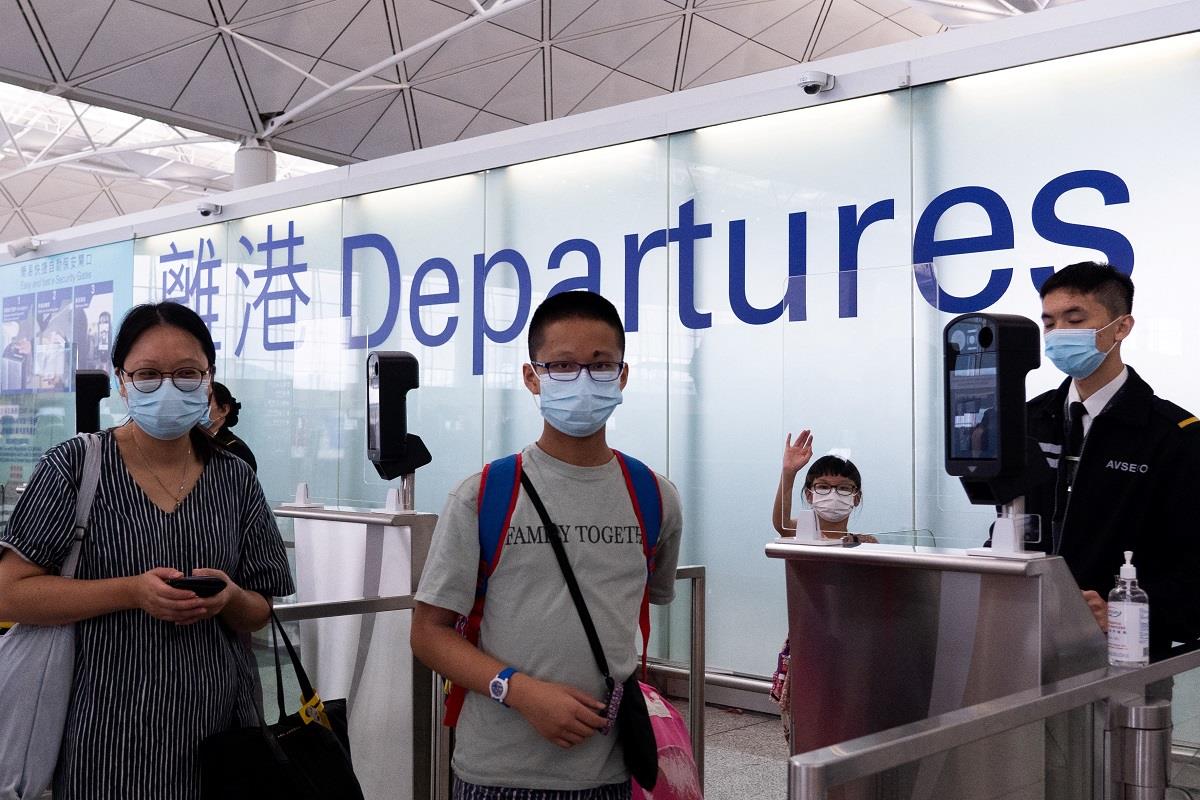(MENAFN- Asia Times) More Hongkongers are expected to leave their home city later this year or in 2022 as tens of thousands of people have applied to move to the United Kingdom via their British National Overseas (BNO) status.
The UK Home Office has said there were 64,900 applications for BNO visas between January 31 and June 30. As of June 30, about 47,300 people have been granted visas, which will allow them to gain UK citizenship within six years.
About 25,600 out-of-country applications for BNO visas were filed in the second quarter, up from 20,600 in the first quarter. The number of in-country applications, under the policy of leave outside the rules (LOTR), which allows Hong Kong people to enter the UK before submitting their visa applications, fell to 5,000 from 13,700 during the period.
About 1,900 people were granted LOTR at the UK border in the second quarter. The LOTR policy for Hongkongers ended on July 20.
On January 31, the British government started a visa scheme for BNO status holders to gain citizenship in the UK. To retaliate, the Chinese government stopped recognizing the BNO as a travel and identity document for Hong Kong people from the same day and reserved the right to take further measures against the UK citizenship scheme.
The UK Home Office forecast that about 123,000 to 153,700 Hong Kong people would move to Britain in the first year under the scheme. It said it expected 258,000 to 322,400 people – or more than one million people in an extreme case scenario – would join the scheme within five years.
Since the implementation of the National Security Law in Hong Kong in June last year, the net outflow of people was 89,200 in the year period ending in mid-2021, census data shows. The outflow was partly offset by 13,900 mainland immigrants.
The government blamed the Covid-19 pandemic and stringent border restrictions for deterring people – such as One-way Permit holders, foreign domestic workers, students and workers – from coming to Hong Kong.

A family poses for a photo before flying to Britain from Hong Kong's International Airport on July 18, 2021. Photo: AFP / Bertha Wang
On July 18, Chief Executive Carrie Lam said that it was normal for Hong Kong people to choose to move to other places for their own and their children's needs as they enjoyed freedom of movement. She added that emigrants would regret it in the future as they would miss out on the huge opportunities in Hong Kong and the Greater Bay Area.
On Thursday, Beijing commented on the exodus of Hong Kong people for the first time.
Huang Liuquan, deputy director of the State Council's Hong Kong and Macau Affairs Office, said during his visit to Hong Kong that it was normal for people in an international city to move in and out.
He said he disagreed with the view that some Hong Kong people left because they had lost confidence in the territory due to the National Security Law. He said the law had helped stabilize the city's market sentiment, seen in Hong Kong's better-than-expected economic data, while some large multinational companies increased their headcounts.
Huang added that Hong Kong's electoral overhaul announced by Beijing in March had contributed to the city's transition“from chaos to governability.”
However, an online survey published by the Hong Kong Public Opinion Research Institute on August 20 showed another picture.
In the survey, a total of 6,981 people aged over 12 were interviewed via email between August 16 and 19. Among those who claimed to be the supporters of democrats, 94% said they had no confidence in Hong Kong's political environment while 3% said they had confidence. Of them, 10% had prepared to leave Hong Kong permanently, 15.5% had plans to leave but had not yet arranged anything, while 53% said they did not have any plans.
Among those who claimed to be the supporters of non-democrats, 36% said they had no confidence in Hong Kong's political environment while 47% said they had confidence. Of them, only 11% had plans to leave while 81% said they did not have any plans.

Hong Kong Chief Executive Carrie Lam speaks during her weekly press conference at the government headquarters in Hong Kong on June 22, 2021. Photo: AFP / Peter Parks
After the data was standardized, the survey showed that 20% of Hong Kong people had plans to leave the city while 71% did not. Seven percent of interviewees could not give a clear answer. One percent had left while another one percent were staying overseas.
Paul Wong Chi-Wai, a lecturer at UOW College Hong Kong, said some people left Hong Kong because they felt their political rights were squeezed by an electoral overhaul in March which would screen out democratic candidates in the coming elections.
Because of the epidemic, some people might choose to leave six months later or once the global Covid situation improved, Wong said.
Margaret Szeto, founder of immigration advisers Aura Global, said the UK had accelerated its approval of BNO visas during the second quarter. She said it was likely that more people would leave Hong Kong in 2022 as it took time for middle-class families to sell and transfer their assets.
According to the UK Home Office, 100% of 7,200 applicants were granted BNO visas in the first quarter but the grant rate fell slightly to 99% when 35,000 applications were approved in the second quarter. The number of refusals was reported as zero but it might be because the number was too small to be rounded to 100.
On August 17, The Times reported the Home Office had put in extra background checks for BNO visa applications, which are“much more thorough than any other,” after some Chinese spies were reportedly posing as dissidents in an attempt to enter the UK through the BNO visa scheme.
The British government also urged people to apply online as they could be spied on outside two applications centers in Hong Kong.
Read: HK's demographic decline hastened by rising exodus
Read: US gives sanctuary to fleeing Hong Kong dissidents
MENAFN27082021000159011032ID1102691984
Legal Disclaimer:
MENAFN provides the information “as is” without warranty of any kind. We do not accept any responsibility or liability for the accuracy, content, images, videos, licenses, completeness, legality, or reliability of the information contained in this article. If you have any complaints or copyright issues related to this article, kindly contact the provider above.